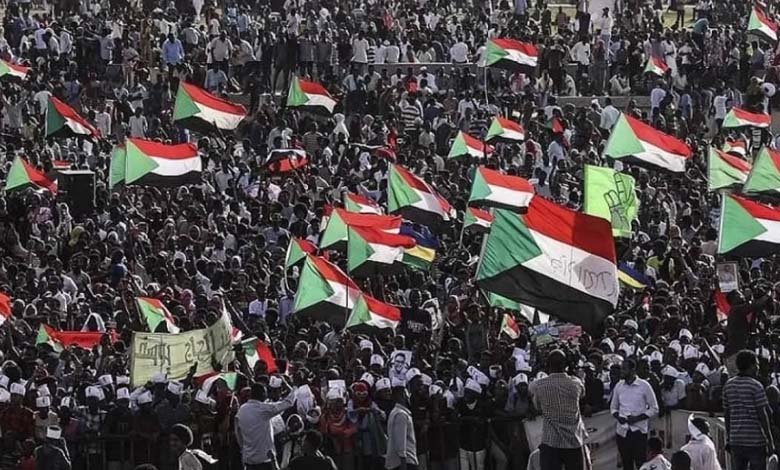Sudan’s Muslim Brotherhood Pushes Army to Attack U.S. Mediation

The Muslim Brotherhood has incited some military leaders to target and discredit the U.S. mediation in an attempt to derail the negotiations.
-
Egypt Faces Strategic Challenges Amidst the Evolution of Sudanese-Iranian Relations
-
Al-Burhan is driving Sudan to become a stage for Iranian and Brotherhood influence
Sudan’s Vice President of the Sovereignty Council and Deputy Commander of the Sudanese army, Shamseddine Kabashi, stated that the government would only go to Geneva to resume negotiations with the Rapid Support Forces (RSF) to set a timeline for implementing the “Jeddah Declaration” for the protection of civilians, and that no entity could dictate to the government what to do.
In a press statement during a meeting with Sudanese and Egyptian journalists in Port Sudan the day before yesterday, Kabashi affirmed that the army was in control of the situation and that the people would soon see changes on the ground, adding, “We are fully confident in our military position.”
-
Tehran in Sudan: Western concerns about the emergence of Sudanese Popular Mobilization Forces
-
The Turkish Al-Burhan and his palace in Ankara
The Deputy Commander of the army harshly criticized Washington, accusing it of stalling and attempting to bypass the “Jeddah Declaration” signed between the army and the RSF in May 2023 through the Geneva negotiations, insisting on including entities supporting the “rebel militia” among the observers.
He affirmed that the government was open and ready for any serious peace negotiations and had given the green light to several entities that expressed their willingness to play a role in ending the Sudanese crisis.
-
Human Rights Watch criticizes Egypt for imposing visas on Sudanese entry
-
Activist reveals names of Egyptian Army casualties in Sudan war
Kabashi also stated that “any peace agreement begins with the implementation of the Jeddah Agreement, and the government will not accept any agreement that grants the RSF a military or political role in the future.”
The Deputy Commander of the army reiterated his refusal to participate in the Geneva negotiations in their current form, asserting that they would not accept a peace that the people do not approve of and that does not allow them to return to their homes occupied by the “RSF militia” and compensate for the losses they have suffered due to looting and property destruction. He added, “If the citizens’ demands are not met, we will continue fighting.”
-
Meeting between Representatives of the Sudanese Army and Rapid Support Forces in Addis Ababa
-
Solutions for Sudan and Libya Crises: el-Sisi Reveals Efforts and Principles
Meanwhile, Jibril Ibrahim, Minister of Finance and leader of the Justice and Equality Movement, stated that the Geneva negotiations aimed to legitimize the RSF as a force after the war, which is why the government refused to participate in those negotiations. He added that if the U.S. administration were serious about ending the war, it would have compelled the forces to implement the “Jeddah Declaration.”
During the same meeting, Ibrahim affirmed that the government would not succumb to pressure and threats, and that the United States could not impose its terms for peace on the Sudanese people.
-
The Sudanese crisis continues.. What are the proposed solutions in the current period?
-
Intensive Egyptian efforts to resolve the Sudanese crisis – Details
He added that the Sudanese government would not compromise on the demands it had set, asserting that it “is ready to negotiate for a just and comprehensive peace, and is not seeking war, but it has been forced upon us because it targets the citizens, not the armed forces.”
Ibrahim also stated that the government would not accept a fragile agreement with the RSF or a truce that would allow them to reorganize their positions to return to war later, and that the door for negotiations remains “ajar,” and the government will return to it whenever the conditions for resuming negotiations are met.
-
Sudanese analyst: The situation in the country is catastrophic and we did not expect it to reach this extent
-
Egypt plays important role in solving Sudan crisis, Sudanese analyst reveals
On the other hand, U.S. envoy Tom Perlow stated that the Geneva negotiations for a ceasefire and the delivery of humanitarian aid in Sudan would continue through “close virtual talks,” after the Sudanese army refused to attend the Geneva negotiations that began on Wednesday, while a delegation from the RSF was present.
The U.S. envoy said in an interview with Radio Dabanga yesterday from Geneva: “Contacts with the Sudanese army continue several times a day as a team and individually, our team, the Egyptians, and the Saudis.” He continued, “We live in a modern world, and we can find ways to consult as we did before and move forward.”












